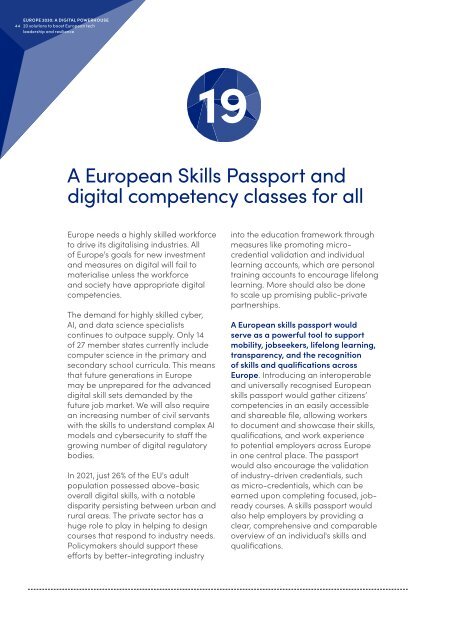DIGITALEUROPE - EUROPE 2030 A DIGITAL POWERHOUSE FINAL WEB_PBP
You also want an ePaper? Increase the reach of your titles
YUMPU automatically turns print PDFs into web optimized ePapers that Google loves.
44<br />
<strong>EUROPE</strong> <strong>2030</strong>: A <strong>DIGITAL</strong> <strong>POWERHOUSE</strong><br />
20 solutions to boost European tech<br />
leadership and resilience<br />
19<br />
A European Skills Passport and<br />
digital competency classes for all<br />
Europe needs a highly skilled workforce<br />
to drive its digitalising industries. All<br />
of Europe’s goals for new investment<br />
and measures on digital will fail to<br />
materialise unless the workforce<br />
and society have appropriate digital<br />
competencies.<br />
The demand for highly skilled cyber,<br />
AI, and data science specialists<br />
continues to outpace supply. Only 14<br />
of 27 member states currently include<br />
computer science in the primary and<br />
secondary school curricula. This means<br />
that future generations in Europe<br />
may be unprepared for the advanced<br />
digital skill sets demanded by the<br />
future job market. We will also require<br />
an increasing number of civil servants<br />
with the skills to understand complex AI<br />
models and cybersecurity to staff the<br />
growing number of digital regulatory<br />
bodies.<br />
In 2021, just 26% of the EU's adult<br />
population possessed above-basic<br />
overall digital skills, with a notable<br />
disparity persisting between urban and<br />
rural areas. The private sector has a<br />
huge role to play in helping to design<br />
courses that respond to industry needs.<br />
Policymakers should support these<br />
efforts by better-integrating industry<br />
into the education framework through<br />
measures like promoting microcredential<br />
validation and individual<br />
learning accounts, which are personal<br />
training accounts to encourage lifelong<br />
learning. More should also be done<br />
to scale up promising public-private<br />
partnerships.<br />
A European skills passport would<br />
serve as a powerful tool to support<br />
mobility, jobseekers, lifelong learning,<br />
transparency, and the recognition<br />
of skills and qualifications across<br />
Europe. Introducing an interoperable<br />
and universally recognised European<br />
skills passport would gather citizens’<br />
competencies in an easily accessible<br />
and shareable file, allowing workers<br />
to document and showcase their skills,<br />
qualifications, and work experience<br />
to potential employers across Europe<br />
in one central place. The passport<br />
would also encourage the validation<br />
of industry-driven credentials, such<br />
as micro-credentials, which can be<br />
earned upon completing focused, jobready<br />
courses. A skills passport would<br />
also help employers by providing a<br />
clear, comprehensive and comparable<br />
overview of an individual's skills and<br />
qualifications.



